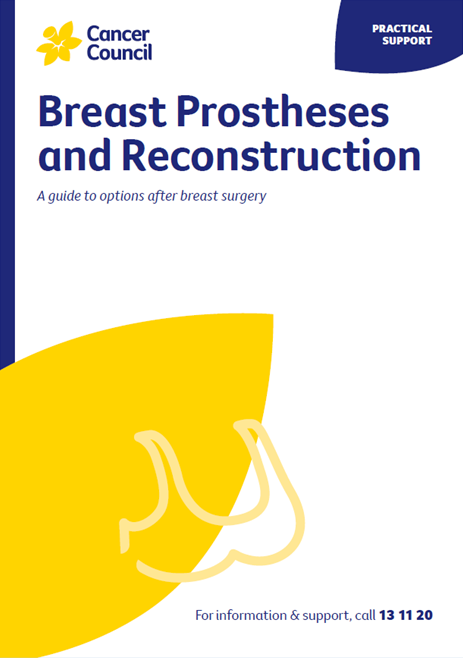- Home
- About Cancer
- Managing side effects
- Breast prostheses and reconstruction
- Breast reconstruction
- What to expect after surgery
What to expect after breast surgery
Everyone reacts to surgery differently. The type of side effects you have will be influenced by the type of surgery you’ve had.
Learn more about:
Appearance of breast
It’s common to feel nervous when the bandages and dressings are first removed. It will take time for the bruising and swelling to fade, and the appearance of a breast reconstruction using a tissue flap may take longer to settle. If you’re disappointed with the appearance of the breast, you may have other operations or procedures to improve the look and shape of the breast.
Your self-esteem is likely to be affected, see Body image for ways to accept the changes in your body.
Pain relief
After any type of operation, you will be given pain medicines to ease your discomfort. You will also probably have small tubes (drains) inserted into the operation site to remove excess fluid, and may go home with them. If you have had a flap reconstruction, you will be sore in the area where the other tissue and/or muscle were taken, as well as in the breast area.
Healing problems
Sometimes the area will not heal well within the first week or so after surgery. This can be caused by infection, poor blood supply or problems with an implant or flap.
Any infection must be treated to reduce the possibility of further complications. If an implant has been used, it might need to be taken out. It may be possible to have a new implant put in at a later date.
Bleeding
Blood may build up in or under the wound. This is called a haematoma, and it causes swelling and pain. A large haematoma may need to be removed by surgery.
Seroma
In some cases, when drains have been removed, extra fluid collects in or under the wound. This is called a seroma, and it causes swelling and pain. It may need to be removed by a health professional using a needle. You can wear a special bra called a compression bra to help relieve the pain.
Scars
All types of breast reconstruction will leave a scar. Everyone heals differently, and the final appearance of a scar will vary, even if the surgery is the same. Most scars have a thickened, red appearance at first, but they will usually fade after about 3 months.
Sometimes the scar stays thick and becomes itchy and uncomfortable. Before the surgery, let your surgeon know if you have other raised, irregular scars (sometimes called keloid scars), as this may show that you are prone to getting these types of scars.
Your surgeon or breast care nurse can advise you about treatments to reduce the discomfort. You may be able to have further surgery to improve the scar’s appearance.
Long-term considerations
Pregnancy
Breast reconstruction doesn’t affect your ability to become pregnant or carry a baby. There is a small risk of having a hernia during pregnancy if you had an abdominal flap reconstruction.
Your doctor will talk to you about any risks you may have and how to manage them.
Breastfeeding
It will not be possible to breastfeed with the reconstructed breast. You may be able to breastfeed successfully with the other breast, although this may be difficult if you have had reduction surgery in this breast.
You can ask a breast care nurse or lactation consultant any questions you have about breastfeeding after a reconstruction.
→ READ MORE: Taking care of yourself after a reconstruction
Podcast for people affected by cancer
Listen now
Dr Jane O’Brien, Specialist Oncoplastic Breast Cancer Surgeon, St Vincent’s Private Hospital, VIC; Clare Bradshaw, Clinical Nurse Consultant, Breast Assessment Unit, Fiona Stanley Hospital, WA; Rene Hahn, Consumer; Sinead Hanley, Consumer; Dr Marc Langbart, Specialist Plastic and Reconstructive Surgeon, Randwick Plastic Surgery, NSW; Melanie Law, Consumer; Sally Levy, Consumer; Annmaree Mitchell, Consumer; Ashleigh Mondolo, Breast Cancer Nurse Clinical Consultant, Mater Private Hospital Brisbane, QLD; Rochelle Osgood, Clinical Nurse Consultant – McGrath Breast Care Nurse, Sunshine Coast University Hospital, QLD: Dr Kallyani Ponniah, Head of Department, Breast Centre, Sir Charles Gairdner Hospital, WA; Meg Rynderman OAM, Consumer; Sarah Stewart, Breast Care Nurse, The Royal Women’s Hospital, VIC; Erin Tidball, 13 11 20 Consultant, Cancer Council NSW; Jane Turner, Senior Exercise Physiologist, Sydney Cancer Survivorship Centre, Concord Cancer Centre, NSW.
View the Cancer Council NSW editorial policy.
